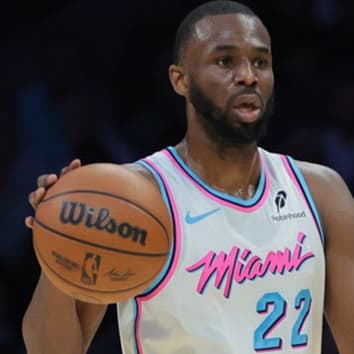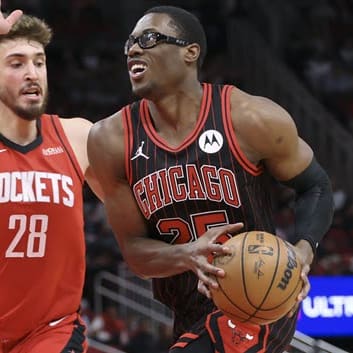It's down to two.
We're more than a week into the NBA's regular season and some rookies are already starting to separate themselves from the rest of the group.
Michael Kidd-Gilchrist dropped 25 on 8-for-12 shooting in a four-point victory over the Mavericks. Dion Waiters went for 28 against the Clippers in a game in which a Waiters missed field goal seemed like a realistic impossibility. Alexey Shved even ridded himself of that mophead that might have actually provoked some sort of physical reaction from Carson Kressley.
Plenty of rookies have had standout games, but only two have held consistency throughout the young season. Those two should come as no surprise: Anthony Davis and Damian Lillard.
When Portland drafted Lillard sixth overall, I wrote that the Trail Blazers would be the perfect team for him, not just because of his ability to start right away, but also because he could be the perfect partner in crime for LaMarcus Aldridge in the pick-and-roll. That has been exactly the case thus far in Portland.
The Blazers have absolutely no bench. In fact, in Saturday's loss to the Spurs, the Blazers' subs had exactly four of the team's 109 points. Lillard has been getting a boatload of minutes and that's going to continue. And that success has plenty to do with the pick-and-roll.
Lillard's pick-and-roll makes up about 44.2 percent of his scoring attempts, by far the most common type of play he likes to run with the ball in his hands.
It's down to two.
We're more than a week into the NBA's regular season and some rookies are already starting to separate themselves from the rest of the group.
Michael Kidd-Gilchrist dropped 25 on 8-for-12 shooting in a four-point victory over the Mavericks. Dion Waiters went for 28 against the Clippers in a game in which a Waiters missed field goal seemed like a realistic impossibility. Alexey Shved even ridded himself of that mophead that might have actually provoked some sort of physical reaction from Carson Kressley.
Plenty of rookies have had standout games, but only two have held consistency throughout the young season. Those two should come as no surprise: Anthony Davis and Damian Lillard.
When Portland drafted Lillard sixth overall, I wrote that the Trail Blazers would be the perfect team for him, not just because of his ability to start right away, but also because he could be the perfect partner in crime for LaMarcus Aldridge in the pick-and-roll. That has been exactly the case thus far in Portland.
The Blazers have absolutely no bench. In fact, in Saturday's loss to the Spurs, the Blazers' subs had exactly four of the team's 109 points. Lillard has been getting a boatload of minutes and that's going to continue. And that success has plenty to do with the pick-and-roll.
Lillard's pick-and-roll makes up about 44.2 percent of his scoring attempts, by far the most common type of play he likes to run with the ball in his hands. Meanwhile, he is shooting 19-for-42 (45.2 percent) as the pick-and-roll ball hander and is averaging 0.91 points per play in those situations, which ranks tenth in the NBA.
It's not just Lillard's ability to make long-range shots at the top of the key that keeps him so successful, but it is also the quickness in his release. Getting rid of the ball so immediately coming off a screen rushes the defense and makes it significantly more difficult to account for Aldridge, who is one of the best roll men or pop players in the league.
Sean Highkin, a Blazers writer at Portland Roundball Society, was on a Twitter-rampage the other night about a potential disconnect between Portland's coaching staff and its front office. He believes - though it is just theory - that general manager Neil Olshey wants to build for the future while head coach Terry Stotts is trying to win now.
Actually, Highkin's point makes a lot of sense. Stotts clearly is trying to win now with this team. Otherwise, why would Wesley Matthews, Nicolas Batum, Aldridge, and Lillard all be averaging between 37.7 and 39.5 minutes per night? Those are distatefully high totals for teams in rebuilding mode.
If that win-in-the-future message does trickle down to Stotts - either because management tells him to lessen the minutes on his players or because the Blazers are 15 games below .500 halfway into the season - those 38 minutes per night that now seem routine to Lillard, may not happen so often anymore.
Brace yourself for a hardly-bold statement coming up: If Lillard's minutes go down, so will his production. Crazy, right? That possibility could eventually be what makes the difference between Lillard and Davis when it comes to sticking them into a fantasy lineup.
Davis hasn't nearly played as much as Lillard because of that concussion he suffered last week against Utah. But much to Monty Williams' anti-concussion likings, he returned Friday and went after the Charlotte Bobcats as if they were the Charlotte 49ers.
9-for-18 from the field.
23 points.
11 rebounds.
Five blocks.
It's hard to ignore the fact that he won't even be 20 years old until March and that not too long ago, he had kindergarten teachers explaining to him that "Indian style" is an inappropriate term to use, but despite age, Davis is already a stud in this league. That game was otherworldly, but it wasn't just dunks and lobs like we saw in the Olympics.
Twelve of Davis' 19 field goals made on the season have come within five feet of the rim, an area where you can often see an inordinately high number of baskets coming on assists. However, Davis has created five of those 12 field goals made in the post on his own, rare to find in a 19-year-old regardless of sample size.
But when you mention Anthony Davis in a fantasy context, the first category that comes up is blocks. And why not? Davis was the type of collegiate shot blocker that made college basketball players around the country have their parents check their closets before bedtime just to make sure the freshman swatter wasn't hiding out in the shadows under the coat rack.
Davis doesn't qualify for any league leader categories - because of his two and a half games missed after that concussion - but if he did, he would find himself seventh in the NBA in blocks per 36 minutes, averaging 2.7 blocks per game in 26.7 minutes (remember that minutes total is skewed down because he was concussed only 14 minutes into the Utah game).
I continue to see the question posed: Who's the better fantasy player? Lillard or Davis?
In reality, that question is a bit irrational if only because those two guys give you such different styles. Need rebounds and blocks? Go for Davis. Need assists and some more points? Get yourself some Lillard.
The Lillard v. Davis debate has been one of the more groundless debates in fantasy basketball over the first week and a half of the NBA season. They've both been dominant at times. They've both been consistently great rookies when on the floor. Let's just apologize to Michael Kidd-Gilchrist and leave it at that.
Fred Katz is an NBA writer for RotoWire. You can contact him on Twitter at @FredKatz or email him at FKatz26@gmail.com.


































